This is the old GEMS website, for current events and news visit our new website.
Lecture: Intellectual Freedom in Early Modern Women’s Spiritual Writings: Practice, Methods, and Identities
Dr. Carme Font-Paz, Associate Professor of English Literature at Universitat Autònoma de Barcelona and director of WINK (Women’s Invisible Ink), is giving a lecture where she’ll be presenting the WINK project and her paper on ‘Intellectual Freedom in Early Modern Women’s Spiritual Writings: Practice, Methods, and Identities’.
April 15, 2024 at 11:30
Blandijn Lokaal 1.14
Contact: Elizabeth.Amann@UGent.be
The essence and manifestation of God’s love has been a major concern for men and women of faith over the centuries, and the object of mystical, fictional and analytical approaches to understanding the relationship between human and divine nature. This presentation will briefly examine the methodological challenges posed by narratives of faith and grace that seek to represent subjective reality as an experience of universal truth.
By paying special attention to four seventeenth-century women writers from different Christian backgrounds, we shall see in what ways their notion of intellectual freedom was constructed and invoked as the primary reason for writing and speaking in public against pastoral misconduct, social ills and domestic abuse within their congregations and communities of faith. Their arguments point at their own freedom of conscience, as well as the “hypocrisie” and superficiality of the alleged “liberty of conscience and freedom” of their own communities. They claim to be intellectually freer in their obedience to God.
This paper will bring to light Maria Jesus de Ágreda manuscript Leyes de la esposa (1637) for the first time, Arcangela Tarabotti’s La semplicità ingannata (1654), Susanna Parr’s Apologie against the Elders (1659), and Anne Wentworth’s A Vindication (1670). We will look at the discourse of divine love and personal conscience as a common feature of female spirituality and intellectuality within a European context, markedly influenced by Teresa de Ávila’s program for mental prayer. We shall discuss the relationship between literary genre and theological tradition, the limits of reason and the imagination as sources of knowledge, and the faint borderlines between obedience and freedom of conscience as paths for intellectual inquiry.
Dr. Carme Font-Paz is Associate Professor of English Literature at Universitat Autònoma de Barcelona. She is also an ICREA Academia fellow and director of the European ERC Starting Grant project WINK “Women’s Invisible Ink: Trans-Genre Writing and the Gendering of Intellectual Value in Early Modernity”. A specialist in prophetic genres and early modern women’s writing, her latest books are Women’s Prophetic Writings in Seventeenth-Century Britain (Routledge, 2017) and, with Nina Geerdink, Economic Imperatives for Women’s Writing in Early Modern Europe (Brill, 2018). She is now preparing her forthcoming monograph Women Writing on Social Change in Early Modern Europe (Brepols).
Exhibition. Vers uit de tuin. Petrus Hondius’ dichterlijke wegwijzer door het zeventiende-eeuwse landschap.
From the 12th of April until the 29th of June 2024 you can visit an exhibition co-curated by GEMS-members Kornee van der Haven and Caroline Baetens in collaboration with Piet de Blaeij from Museum Het Warenhuis. The exhibition centres around the early modern Dutch poem Dapes inemptae, of de Moufe-Schans (1621) in which Petrus Hondius celebrates his life in the garden the ‘Moffenschans’. You can explore the seventeenth-century garden life in this exhibition through Hondius’ verses. You walk through the garden and the poetry to get a unique picture of garden life in the seventeenth century. The garden comes to life as a place of pleasant gatherings, of plant science, of experimenting with nature and landscape, but also as a place where you can indulge in gardening.
Vers uit de tuin. Petrus Hondius’ dichterlijke wegwijzer door het zeventiende-eeuwse landschap.
Tentoonstelling UGent & Museum Het Warenhuis (Axel), 12 april – 29 juni 2024
Bij verse oogst uit de tuin denk je waarschijnlijk in de eerste plaats aan wortels of komkommer. In de zeventiende eeuw oogstten tuinbezitters niet alleen groenten, maar ook dichterlijke verzen uit de Zeeuws-Vlaamse grond! Die gedichten geven een inkijkje in hoe het rijke tuinleven in de zeventiende eeuw werd ervaren. Een van de eersten die over dat leven in de tuin dichtte, was predikant Petrus Hondius. In 1621 bezingt hij in zijn dichtwerk, Dapes Inemptae, of De Moufe-schans, alles wat er te beleven valt in zijn tuin bij Terneuzen (de Moffenschans): van maaltijden met groenten van eigen bodem, tot de kweek van zeldzame bloemen en uitstapjes door de omliggende velden.
Van 12 april tot 29 juni 2024 kun je in Museum Het Warenhuis te Axel via Hondius’ wandelpaden zelf het zeventiende-eeuwse tuinleven verkennen in de expositie. Je bewandelt de gangen van de tuin via het dichtwerk en krijgt zo een uniek beeld van het tuinleven in de zeventiende eeuw. De tuin komt tot leven als een plek van gezellige samenkomsten, van plantwetenschap, van experiment met natuur en landschap, maar ook als een plaats waar je je kunt uitleven in het tuinieren. Wie weet herken je je eigen ervaringen wel in Hondius’ verzen of leiden zijn wandelpaden je tot nieuwe inzichten over de hedendaagse tuin!
Veel idealen uit Hondius’ poëzie zijn herkenbaar voor een hedendaagse lezer. Net zoals stedelingen vandaag aan de drukte trachten te ontsnappen in een tuin of park, zochten diegenen die daar de mogelijkheid toe hadden ook in de zeventiende eeuw de rust van het platteland op. De Terneuzense predikant geeft dan ook uitdrukking aan die herkenbare drang naar ontsnapping in een groen decor. Ook hedendaagse idealen van zelfvoorzienendheid of lokaal shoppen lijken al vroeg in die literatuur vorm te krijgen, want ook Hondius streeft naar ‘Ongekochte spijs’ of groenten van eigen bodem. Zijn verhaal schetst niet alleen een uniek beeld van het rijke tuinleven in de zeventiende eeuw, maar biedt dus ook een leidraad voor reflectie op onze bedrijvigheid in de tuin vandaag.
Als je het museum uit stapt, kun je de wandeling verderzetten en met een nieuwe blik het landschap rondom verkennen. Op een boogscheut van het museum vind je een laatnegentiende-eeuws landhuis dat nog steeds de naam ‘Moffenschans’ draagt, naar Hondius’ tuin die zich daar eeuwen eerder bevond. Te voet, te paard of te vloot bereist Hondius vandaaruit de polders, schorren, duinen en rivieren rondom zijn tuin. Hij treedt buiten de omheining en legt een breder beeld van het Zeeuws-Vlaamse landschap vast in woord. In de expositie leer je dus iets nieuws over de zeventiende-eeuwse beleving van de directe omgeving van de tuin en het hedendaagse museum.
Ontdek wat het Zeeuws-Vlaamse tuinleven in de zeventiende eeuw zo uniek en toch zo universeel maakt, van 12 april tot 29 juni 2024 in Museum Het Warenhuis (Markt 2, 4571 BG Axel).
Dit project is een samenwerking tussen Museum Het Warenhuis en de Vakgroep letterkunde aan de Universiteit Gent. De expositie kwam tot stand met de steun van de Faculteit Letteren en Wijsbegeerte van de Universiteit Gent, het Maatschappelijk Valorisatiefonds van de Universiteit Gent, het Fonds Wetenschappelijk Onderzoek – Vlaanderen en het Scheldemondfonds.

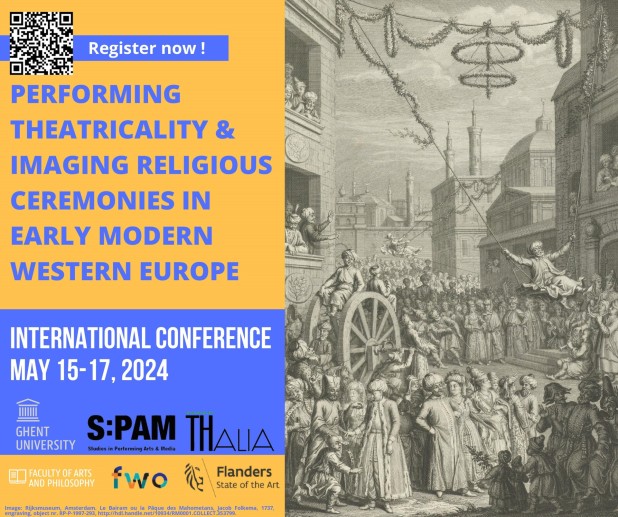
Conference: ‘Performing theatricality and imaging religious ceremonies in early modern Western Europe’
VANDENHOVE (Centre for Architecture and Art at Ghent University) is hosting a conference on ‘Performing theatricality and imaging religious ceremonies in early modern Western Europe’
15-16-17 May
Register using the QR code or registration link
2023 marks the 300th anniversary of the publication of the early eighteenth-century book series Cérémonies et coutumes religieuses de tous les peuples du monde, a work on all the world’s religions known to Europe at that time and originally published in seven volumes between 1723 and 1737 in Amsterdam. Edited by the exiled French Huguenot Jean Frederic Bernard, the original seven volumes of the Cérémonies knew a vast distribution across European readers in the Netherlands, France, England, and the Holy Roman Empire, among other countries. Its popularity was at least partly due to the impressive set of prints included within the books. After all, the engravings were for the most part manufactured by the exiled Parisian artist, Bernard Picart, who was known as one of Europe’s most distinguished engravers at that time.
More than ten years after the publication of some pioneering studies on the project – Religionsbilder der frühen Aufklärung (2006), The Book That Changed Europe (2010) and The First Global Vision of Religion (2010) – the intriguing ceremonies and customs of the various religions depicted in the books still capture the imagination. This is not only caused by their ingenuity regarding the comparative method of inquiry into religion in general, as earlier research widely acknowledged, but also because of their importance as an early modern compendium of imaging religious ceremonies. After all, as the title already indicates, the Cérémonies discusses global religious ceremonies and customs. It focusses on performing religion, instead of on religion as such.
In line with Picart and Bernard’s project, this conference aims to focus on the ways in which early modern Europeans related to religious ceremonies of all kinds, ranging from customs that were familiar to Western Europe’s everyday religious life, to rituals from peoples across the globe that were still rather alien to early modern Europeans. How did early modern Europeans perceive religious rituals practiced in other parts of the world, particularly those in overseas territories? To what extent did early modern knowledge production on religious customs contribute to the development of early anthropology and ethnography in the latter half of the eighteenth century? How did representations of religious rituals either endorse or challenge existing knowledge on various religious practices? In what ways did the early modern period witness a shift toward a more encyclopedic approach to representing the ceremonies and customs of various religions, and how did this reflect broader intellectual trends of the Enlightenment era?

GEMS Presents: Young Researcher’s Day
Join GEMS on the 22nd of April for the Young Researcher’s Day, a work-in-progress session by MA students where they will be presenting their research through a short poster presentation, with ample time for questions. The presentations aim to help students fine-tune their research and are a great opportunity to get feedback from their peers and other researchers in the field of early modern cultural history and literature.
Location: Library Lab, Magnel Wing – 11am-3pm
Presentations:
- Widow Immolation (Sati) as a Religious Practice: Crystallisation of a European Image of India in the 18th Century
- The Late Medieval and Early Modern in Macbeth: The Transgressive Power of Blood, the Body and the Supernatural
- European Science Theories in 18th Century Latin America: The Almanacs of Cosme Bueno
- Early Modern Death: The Function and Form of Death in Everyman, The Faerie Queene, “Death Be Not Proud”, Paradise Lost and The Pilgrim’s Progress
- Trauma and Cognition in 20th Century Fiction
- Asexuality in Media
We encourage researchers who are interested to attend and register through this form by the 17th of April. Lunch and refreshments will be provided. If you have any further questions, feel free to contact Eru.Fevery@UGent.be and Caroline.Baetens@UGent.be
We hope to see you there!
JUST OUT: Renaissance Studies Special Issue on Paratexts, Dissemination and the Book Market in Early Modern Venice (1500-1650)
The Journal of the Society for Renaissance Studies presents a special issue on Paratexts, Dissemination and the Book Market in Early Modern Venice (1500-1650), with articles from GEMS members Ruben Celani, Claudia Crocco, Teodoro Katinis, Eleonora Serra and Lies Verbaere. This collaboration consists of research across literature and linguistics.
Visit the website for more information.
Featured articles
- Gazing at the Venetian hub from a paratextual lens: An introduction
Claudia Crocco and Teodoro Katinis - Advertising grammars and dictionaries in the Venetian printing market: A linguistic analysis of title pages
Eleonora Serra - ‘L’arte in prattica’: Reconstructing Orazio Toscanella’s language ideology
Claudia Crocco and Eleonora Serra - ‘Come parto imperfetto’: Paratexts and organization in a sixteenth-century book of secrets
Ruben Celani - The vernacularization of Paduan medicine and philosophy in the seventeenth century: Troilo Lancetta’s Raccolta medica, et astrologica
Craig Martin - ‘Materie piacevolissime da leggere e utili da essequire’: The introductory letters in Leonardo Fioravanti’s Capricci medicinali
Teodoro Katinis - ‘By consultation of elevated minds’: The role of paratexts in Giovanni Battista Calderari’s comedies
Lies Verbaere - Advertising doubt in early modern Italy: Doubt and ignorance in early modern paratexts
Marco Faini
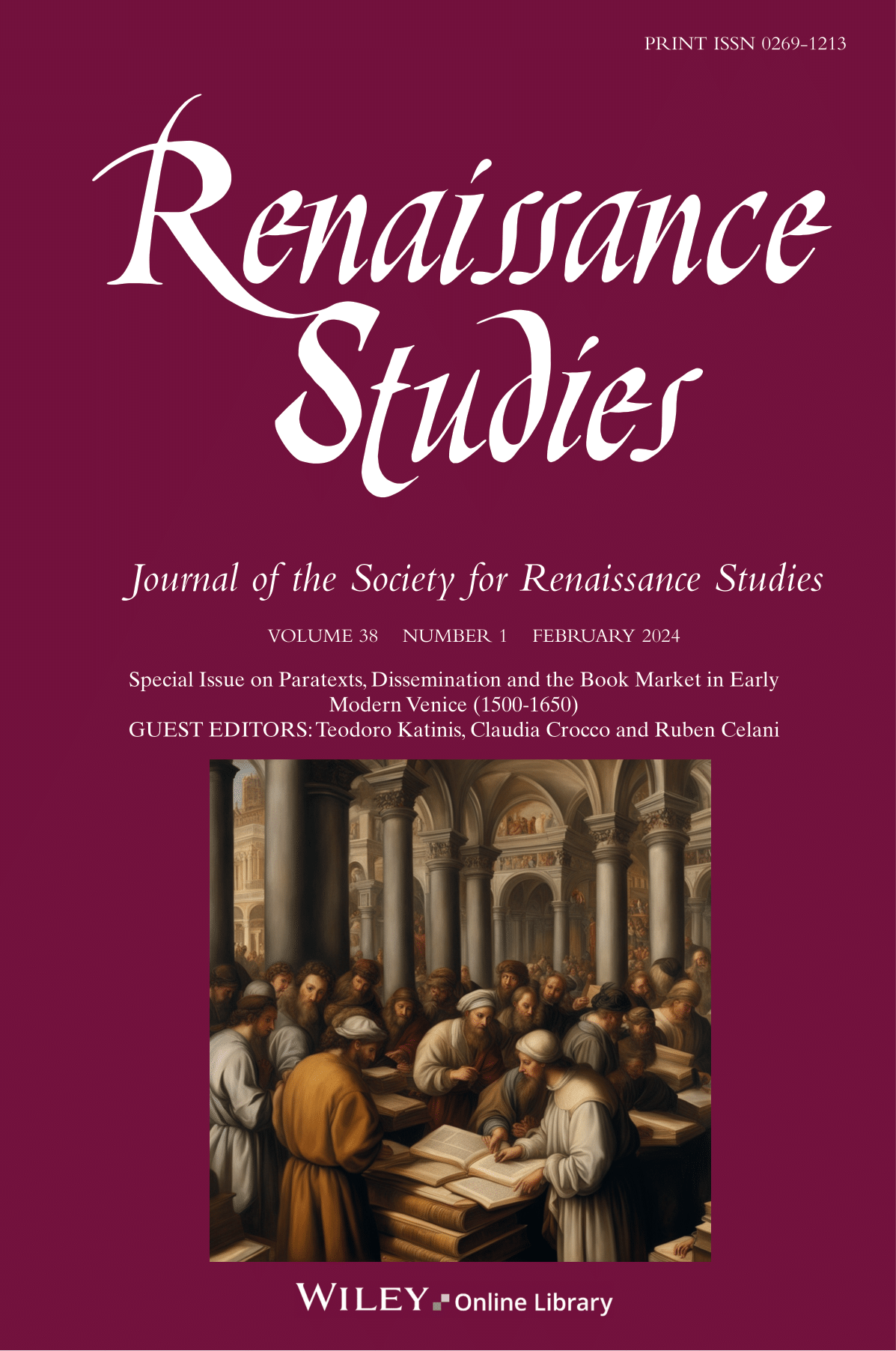
Book presentation: Repertoires of Slavery. Dutch Theater Between Abolitionism and Colonial Subjection, 1770-1810
Join GEMS on the 22th of February for a Book Presentation by dr. Sarah J. Adams. She will present her new book Repertoires of Slavery: Dutch Theater Between Abolitionism and Colonial Subjection, 1770-1810 (University Press Amsterdam, 2023). Through the lens of a hitherto unstudied repertoire of Dutch abolitionist theatre productions, Repertoires of Slavery prises open the conflicting ideological functions of antislavery discourse within and outside the walls of the theatre and examines the ways in which abolitionist protesters wielded the strife-ridden question of slavery to negotiate the meanings of human rights, subjecthood, and subjection.
For more information and to order the book, you can follow this link: https://www.aup.nl/en/book/9789463726863/repertoires-of-slavery
Please let us know if you can attend by the 16th of February through the following link: https://forms.gle/kuPeG66SofhWZjaSA
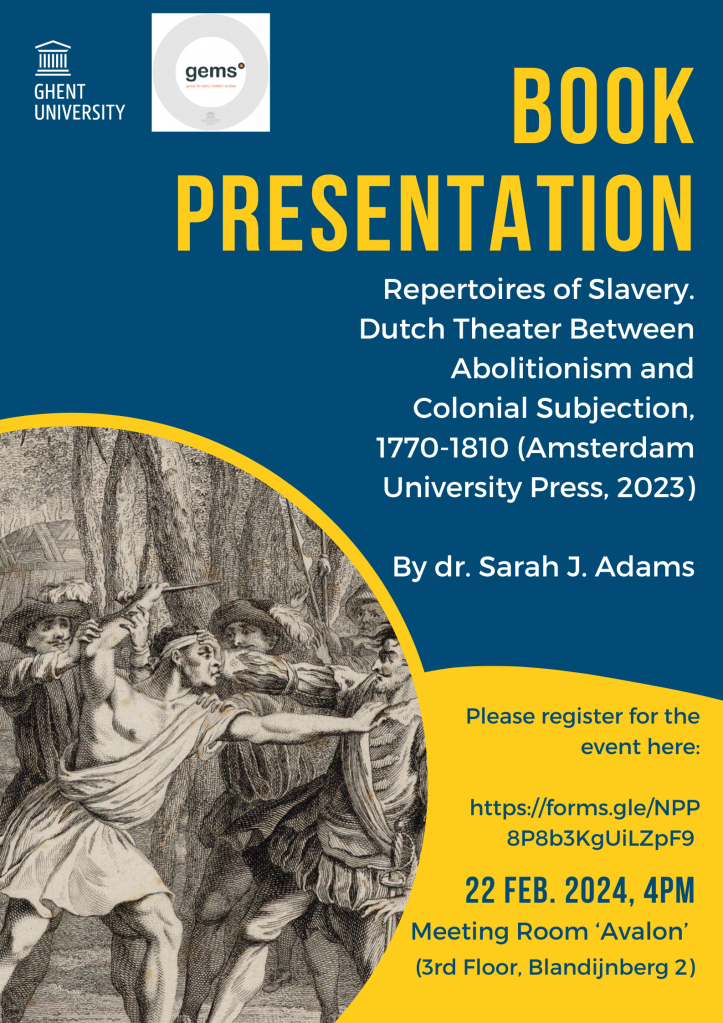

Lecture: “Transvestism and Blackface in Italian Renaissance Theater” by Lies Verbaere
Renaissance authors tended to fall back on classical literary models, which they wanted to equal or even surpass. In the case of theater, Terence’s Eunuchus was one of the most popular model texts. In the city of Vicenza, near Venice, Giovanni Battista Calderari began to translate this comedy into Italian, but not only that: he also began to rework it. The result is a fascinating rewrite, in which, for example, the secondary character of the ‘Other’ becomes a Moorish woman. In this lecture we place Calderari’s text next to the original, and highlight current issues such as gender, ethnicity and performance in a play text from the Renaissance – which is not so far removed from our own time.
Tuesday January 23, 2024, 7:30 PM
Followed by reception
Rozier Building, Classroom 2.1 Rozier 44 – 9000 Ghent
Call for Papers Yearbook for Dutch Book History 32 (2025)
The Yearbook for Dutch Book History publishes Open Access articles in the Dutch and English language on all aspects of the book history of the Low Countries. For the 32nd edition of 2025, they particularly welcome contributions within the theme of “Books across borders.”
American thrillers, Japanese manga and Kenyan novels: our current book world often transcends national and linguistic borders. Likewise, throughout history the Dutch book trade has always been connected – enthusiastically or reluctantly – with the world at large. With its 2025 thematic issue, “books across borders,” the Yearbook for Dutch Book History invites you to explore beyond the usual boundaries. Examples of topics include, but are not limited to, printed matter that highlights (or conversely, covers up) ties to colonial territories, pictographic, logographic or abugida scripts printed in the Low Countries, or books created in supranational cooperation.
They welcome articles related to:
- (Post-)colonial books, their production and reception
- Dutch printed matter produced elsewhere
- Illustrations or techniques from other parts of the world, applied in the Low Countries
- Different types of (non-Latin) typography, printed in the Low Countries
- Multilingual publications
- Supranational collaborations and transnational perspectives.
Please submit your proposal or abstract to the editors before April 1, 2024 (jaarboeknbv@gmail.com or via one of their editors). The deadline for submitting full articles is November 1, 2024.
Book presentation: Marketing Violence. The Affective Economy of Violent Imageries in the Dutch Republic
Book presentation
Marketing Violence: The Affective Economy of Violent Imageries in the Dutch Republic
Tuesday 23 January 2024
14:30 – 17:00
NIAS Conference Room – B3.02, Oost-Indish Huis in Amsterdam
Registration is required before 22nd of January via email (free): secretariaatnl-lab@huc.knaw.nl
specify “Book presentation Marketing Violence” in the subject line
Marketing Violence was published by Cambridge University Press as part of the Elements in Histories of Emotions and the Senses series and written as part of the NWO & FWO funded project Imagineering Violence: Techniques of Early Modern Performativity in the Northern and Southern Netherlands 1630-1690.
Frans-Willem Korsten, Inger Leemans, Cornelis van der Haven and Karel Vanhaesebrouck invite you to join them for the presentation of their recently published book Marketing Violence on Tuesday 23 January in the NIAS conference room.
Marketing Violence is available through open access: https://www.cambridge.org/core/elements/marketing-violence/2156DA0F35E440BE3F23E730FD1FA663.
Program:
14:30 Walk-in
15:00 -15:15 Introduction by dr. Yolanda Rodríguez Pérez
15:15 -15:25 Prof. Dr. Frans-Willem Korsten’s reflections on the collaborative process of Marketing Violence
15:25 – 15:35 Prof. Dr. Kornee van der Haven on the History of Emotions
15:35 – 15:55 Dr. Ayşenur Korkmaz on representations of violence from the perspective of genocide studies
15:55 – 16:20 Dr. Matthias van Rossum on colonialism and the History of Emotions
16:20 -17:00 Drinks!
Find the invitation and more information via this link: Invitation book presentation Marketing Violence
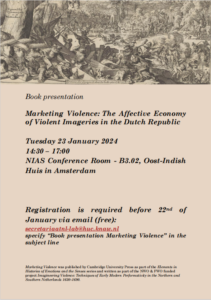
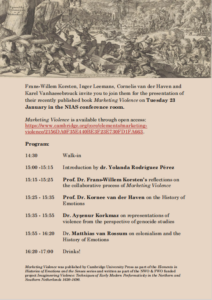
You must be logged in to post a comment.